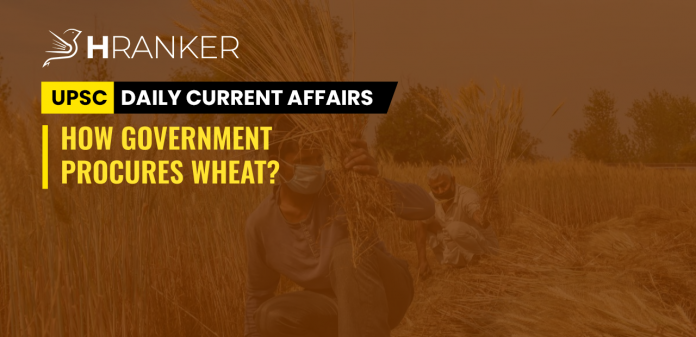WHAT’S IN NEWS: The procurement of wheat in the 2022-23 Rabi marketing season is in progress in a number of states. How much does the government procure, why and for whom, at what price, and through what process?
PROCUREMENT OF FOOD GRAINS:
- The government procures foodgrains — rice, wheat, and coarse grains — in order to ensure that farmers receive the minimum support price (MSP), and a stock is maintained to distribute to the poor under the public distribution system (PDS) and other schemes. Government also ensures effective market intervention so as to keep the prices under check and add to the overall food security of the country.
- The government has a carryover stock of 19 million tonnes and needs 25 million tonnes for food subsidy programmes.
How is the procurement carried out?
The Food Corporation of India (FCI), along with state government agencies (SGAs), procures wheat. The FCI’s wheat procurement system can be decentralised (DCP) or centralised (non-DCP).
Under the centralised procurement system, the procurement of foodgrains in Central Pool is undertaken either by FCI directly or by State Govt. Agencies (SGA).
CENTRAL POOL refers to stocks procured through MSP operations for welfare schemes and calamity relief.
Quantity procured by SGAs is handed over to FCI for storage and subsequent issue against Government of India (GOI) allocations in the same State or movement of surplus stocks to other States.
The cost of the foodgrains procured by State agencies is reimbursed by FCI as per Provisional per cost-sheet issued by GOI as soon as the stocks are delivered to FCI.
Under the CENTRALISED SYSTEM, in states like Punjab and Haryana, FCI/ state agencies procure wheat from farmers through arhtiyas (commission agents) as per the state APMC Act. In other states, wheat (or paddy) is procured directly from the farmers by FCI or SGAs.
Under the DECENTRALISED SYSTEM, state governments or their agencies procure, store, and distribute rice, wheat, or coarse grains, against the GOI’s allocation for the targeted public distribution system and other welfare schemes (OWS) in the state.
According to FCI, “The excess stocks (rice & wheat) procured by the State/ its agencies are handed over to FCI in Central Pool. The expenditure incurred by the State Government on procurement, storage and distribution of DCP (Decentralised Procurement) stocks are reimbursed by Government of India on the laid down principles.
The expenses such as MSP, arhatiya/society commission, administrative charges, mandi labour charges, transportation charges, custody & maintenance charges, interest charges, gunny cost, milling charges and statutory taxes are reimbursed on actual basis. The cost of excess stocks handed over to FCI is reimbursed by FCI.
Table of Contents




